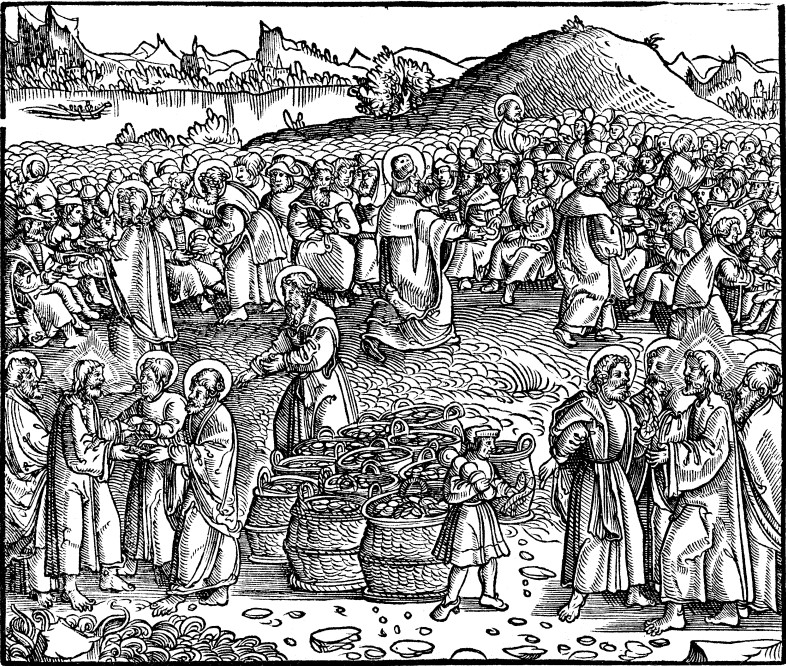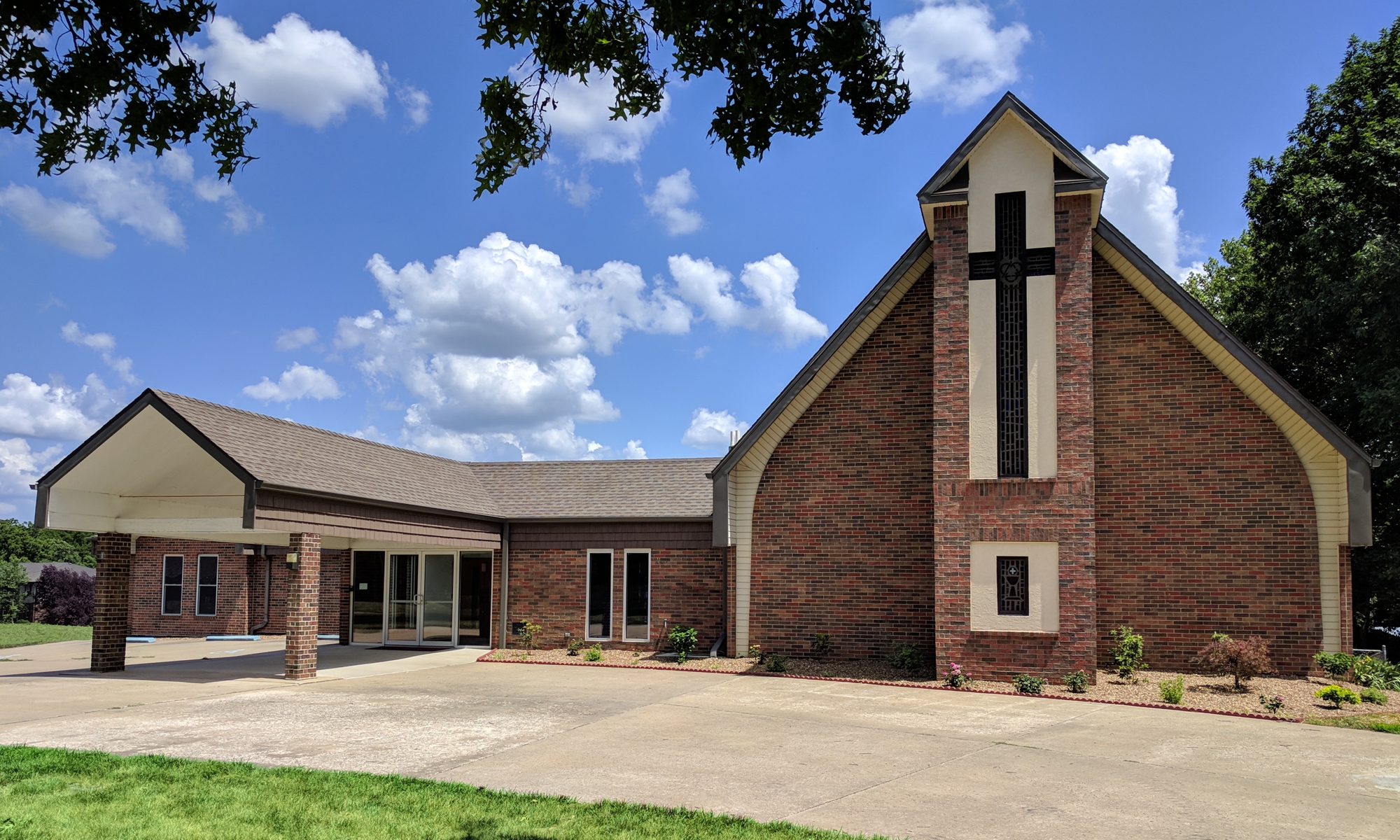
Lessons: Isaiah 49:8-13, Acts 2:41-47, John 6:1-15
Hymns: LSB 571, 743, 625, 420, 422, 692
Grace, mercy, and peace to you from God our Father and our Lord and Savior, Jesus Christ. Amen.
Words have meaning. They are not empty. We speak to communicate. And God speaks to us to deliver His truth. His Word does what it says, for God the Holy Spirit is always at work when God’s pure Word is proclaimed and taught. God accomplishes what He pleases through His Word. The phrase, “Sticks and stones may hurt my bones, but words will never hurt me” is false. We may try to brush off the hurtful things of others when applying this phrase, but that does not mean we go unscarred. Because others can and do say hurtful things (and face it, we’re all guilty of hurting others with our own words), it shows that words certainly hurt. Thankfully, God uses words for our good. In His Word, He forgives us. Jesus really took away our sin on the cross. He even cleanses us of the scars and pollution we have received through the hurtful words of others.
Another way words are not always helpful is in some of the idioms we say. We often don’t think about what those words mean. One such phrase is “to die for.” After biting into chocolate lava cake, someone may say, “Oh, this is cake is to die for!” Is it really? Worth dying for? Obviously, the phrase is an exaggeration, but should Christians be found saying it? What’s this fixation on death when God is the author of life? We shouldn’t equate enjoyable first article gifts with death.
Yet, there are some things worth dying for. In His divine love, God decided we are worth dying for. That’s why Jesus came. He wanted to reconcile us to our Father in Heaven. We are precious to Him. He holds us as the apple of His eye. He gives us worth beyond comparing and died on the cross to save us. We are worth it to Him. Because we are God’s creation made in His image, there is no such thing as an unwanted or unloved person. God has a plan and purpose for all people. And so, He died for us.
Other things that are literally to die for involve crosses placed upon us. We don’t make that choice, such as being in the position to save another’s life which then costs our own, defending our country, and defending the pure confession of the Christian faith. We are entering the time when the Church rite of Confirmation often takes place. We promise at Confirmation that we will suffer all, even death, rather than fall away from God’s Word. In Acts 5:40-41, the Apostles were beaten and commanded not to speak in the name of Jesus. Their response? They “rejoiced that they were counted worthy to suffer dishonor for the name” of Jesus. And they kept on preaching. Following Christ may involve the loss of earthly goods and could cost our lives. So be it.
Another idiom that is not good is, “The devil is in the details.” This relatively new phrase has become quite common. People want to emphasize the importance of paying attention to details. If not, things might go awry. Most people planning for a banquet (or a wedding feast) examine the smallest details because they want things to go smoothly. If they overlook this or that detail, problems may arise and the feast won’t go well. This idiom is based on a much better one used in the German language. The Germans say, “Der liebe Gott steckt im Detail,” which means, “God is in the details.” You see, God pays attention to all the details even when it doesn’t seem so, as we shall hear in our Gospel account when Jesus feeds the 5000.
Some people pay careful attention to details. In many cases, this is good. In some cases, it is not. Some get so bogged down with detail, they have difficulty functioning. As the saying goes, “They cannot see the forest for the trees.” But others don’t pay much attention to detail. They come up with grand ideas or take too broad of a picture. They overlook necessary details. They may dream big but their aspirations fall flat. For them, “they cannot see the trees for the forest.”
At first glance, it would seem as if that’s what’s happening in today’s Gospel. A multitude had seen the signs Jesus performed on the sick. They witnessed His miracles. They were focused on one detail—that Jesus can heal people. They did not take a step back to see who He really is (that is, God Himself). They wanted to witness more amazing acts of God. They become so fixated on that aspect of Jesus that they didn’t realize what was happening. They walked into a wilderness up a mountain—a place where there’s no food—and they are getting too far away from food sources.
Jesus sees the crowd approaching and speaks. From the surface, it seems Jesus also forgot to pay attention to the details. But His words are a test. He asks Philip, “Where should we buy bread, so that these people may eat?” The tone of voice Philip spoke could well have been less than charitable. “Look, Jesus, if I could work for 200 days in this moment and get paid right now to go buy food—if that were even possible in this wilderness—I would only have enough for each person to have just a small amount.” It’s like saying today, “Look thousands of people suddenly descended upon Lexington. If I had enough money to buy out the local restaurants, I would. But that won’t be enough to feed everyone!” Then Andrew finds a boy with five barley loaves and two fish. He’s not impressed either, asking Jesus, “What good is this paltry amount of food?” It’s like they were hinting at Jesus that He forgot to pay attention to the details.
But Jesus declares, “Have the people sit down.” Apparently, He noticed the details. Our Gospel reports that there was much grass in that place. Jesus didn’t lead them up some uncomfortable, rocky mountain. Instead, He leads them to a specific grassy mountain. The only time the New Testament describes the people being in a grassy place is here when Jesus feeds the 5000. Jesus leads them to a comfortable and pleasant place—a green pasture, which is what our Lord does as the Good Shepherd. He led them to this mountainside so that He can reveal His glory and feed them. He can do far more than heal the sick. He can produce much out of little, feeding the multitude.
The people are told to be seated. Jesus then blesses the food, giving thanks. In doing so, He speaks. His Word accomplishes His will. His Word has power. He distributes the food through the disciples. Everyone gets as much as they want until they are filled. Jesus performs a stunning miracle. No one had to go out and buy bread. Jesus did not desert them, leaving them hungry. Jesus reveals His compassion, His ability, and His divinity.
And our Lord, truly being a Master of details, wants to let nothing go to waste. He asks for all leftovers to be gathered. They filled up 12 baskets from those five barley loaves! This shows us even further the amazing work of God. More is left over than at the beginning.
We are not told what happens to those leftovers, but since Jesus doesn’t want to waste it, this implies they would have eventually eaten it. In our day, it would have been thrown away. All the disease and food experts caution us about safe food handling. Those leftovers won’t pass the health department’s inspection. It’s amazing how wasteful we are, especially considering that some people in our world suffer famines and starvation. Our wastefulness is shown on trash day when many of those giant red trash bins are overflowing.
Anyway, it’s interesting to hear what the secularists say about the world and humanity in general. They look at mankind as accidents or evolutionary products. They think we are destroying our planet and will someday go extinct—as if we are waste or disposable.
In contrast to that, God has a different view of man. He created the entire universe. He made us in a very special way as He formed the dust of the ground and breathed life into Adam and created Eve from Adam’s rib. He created us in His image. He gave us souls. He loves us. We are no accidents or results of chance. He loves us so much He sent His only begotten Son to redeem us and reconcile us to our Father.
There may be times in our lives when it seems like God doesn’t pay attention to the details. We may be tempted to think, “If only God changed this detail, then this thing wouldn’t have happened to me.” But the reality is that God certainly pays attention to all the details. He uses all things for our good. And look at how detailed our own bodies are and how many things must work together! Look at how detailed our world is and how life is sustained by so much working together! Those are details God created! When we suffer bodily, we may think there’s a detail God forgot. But He hasn’t. Look at all the details that still function! Lungs, brain, muscles, stomach, blood, cells, and so on.
There’s no detail God misses. And even more so, there’s no detail God has missed when it comes to your salvation. A detail our Gospel reports is that the Passover is near. The Passover reminded God’s people of how He rescued them from their bondage to the Egyptians, and it looked forward to Christ who would serve as the Passover Lamb by dying on the cross. Also, Jesus used bread to feed the multitude. He took from very little and gave them a lot. Jesus does the same for us. His death atoned for the sins of the entire world. And Jesus, who is risen and is seated at the right hand of the Father, becomes present in the Lord’s Supper. When the bread and wine are blessed, the Body and Blood of Jesus are truly here. He is not limited to Heaven as some have asserted, but we truly receive Him for our forgiveness in the Sacrament. And this is so, not just because God has the power to do all things, but because the Word of God accomplishes God’s will. It pleases Jesus to make Himself present in the Lord’s Supper through His Word. And so, we rejoice that God continues to pay attention to the details on our lives, accomplishing His will through His Word. He is truly the promised Prophet. And He reigns as our King. Amen.
The peace of God which passes all understanding keep your hearts and minds in Christ Jesus to life everlasting. Amen

